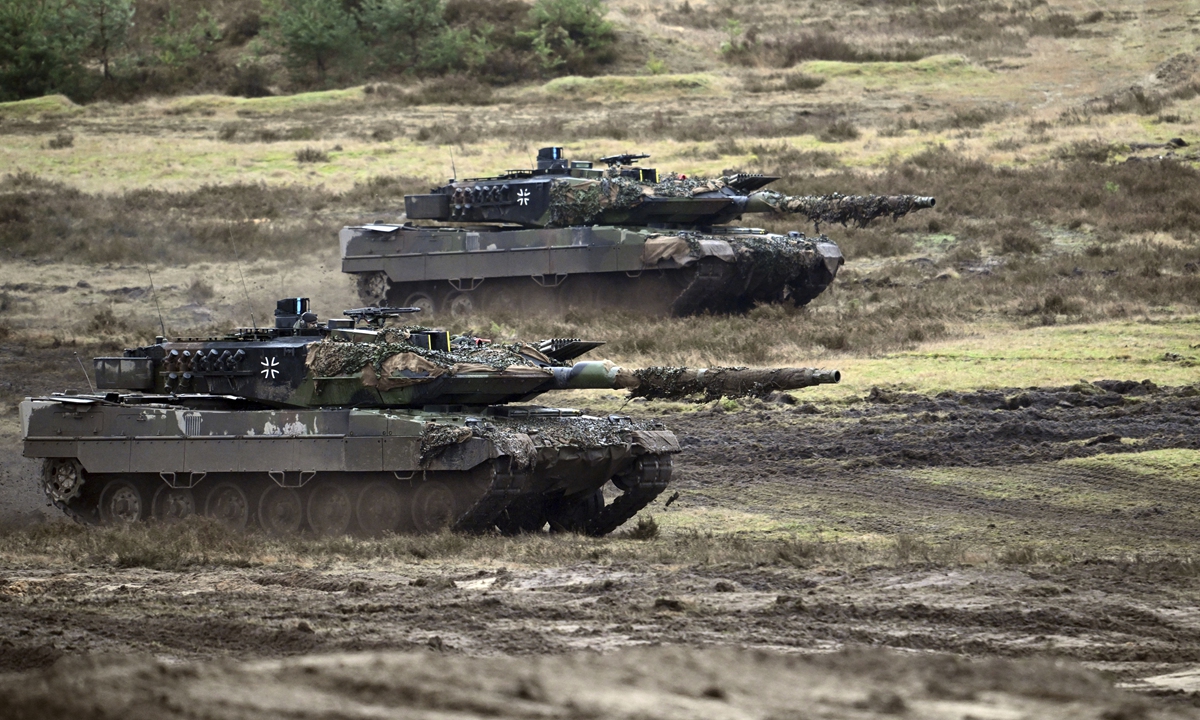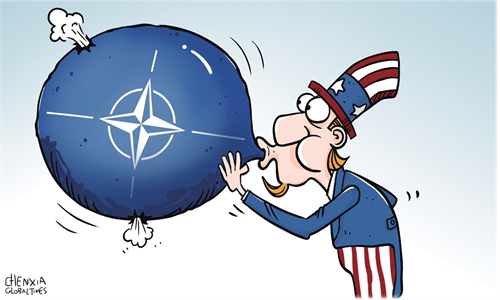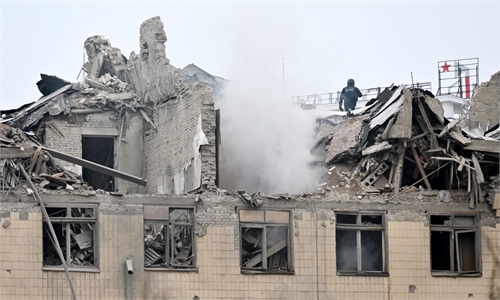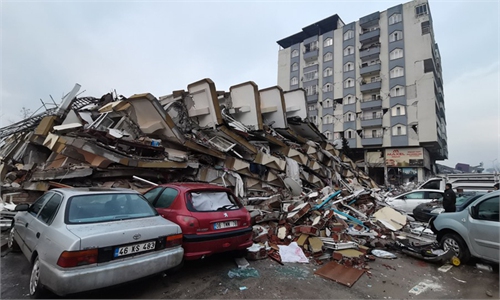'We are engaged in a dangerous game of one-upmanship on weapons supplies to Ukraine:' German MP

Two Leopard 2A6s from the German Army's Tank Battalion 203 drive across the Senne military training area on February 1, 2023. Photo: VCG
Editor's Note:The Russia-Ukraine conflict is approaching its one-year mark, with no end in sight. It is eating up scarce European resources, preventing millions of refugees from returning home and weakening the global economic outlook while the US and some European countries are fanning the flames of the war, keeping sending weapons to Ukraine. How will the Russia-Ukraine conflict end? What are the biggest stumbling blocks for negotiation and diplomatic resolution?
In an interview with Global Times (GT) reporter Yu Jincui, Sevim Dagdelen (Dagdelen), Chairwoman of the Left Party parliamentary group in the Committee on Foreign Affairs of the German Bundestag and Spokeswoman for international relations and disarmament, said what dominates in NATO countries now is a military logic driven by a war-hungry political and media elite that is focused on the illusory and highly dangerous aim of military victory over Russia. "We need to put a spanner in the works for the warmongers," she said. Dagdelen also claimed EU countries have acted as servile vassals of the US and at the same time endangering their own populations.
This is the second installment of the series.
GT: What's your prediction for the Russia-Ukraine conflict this year? What is the biggest obstacle to a diplomatic solution?
Dagdelen: Things have developed to a point where the US is now conducting a proxy war against Russia in Ukraine, with the help of its NATO allies. NATO's war aim is evidently to destroy Russia by supplying increasingly heavy weapons to Ukraine and by waging an economic war on Russia. The West torpedoed the talks between Russia and Ukraine in 2022 and still appears to have no interest in a negotiated settlement, instead aiming on the continuation of the war until victory over Russia. The longer the war in Ukraine goes on, the greater are not only the suffering and the immense costs on all sides but also the danger of further escalation, ultimately including nuclear war.
The greatest obstacle to a diplomatic solution resides in the failure of the NATO countries' governments to speak honestly about their war aims. Rather than working toward a ceasefire in the spirit of the talks in Istanbul last March - which failed because the West, especially the US and UK, withdrew their support, as former Israeli prime minister Naftali Bennett recently confirmed in an interview - what dominates here in Germany, like in other NATO countries, is a military logic driven by a war-hungry political and media elite that is focused on the illusory and highly dangerous aim of military victory over Russia. The discourse surrounding the German government's decision to expand its military support and send Leopard heavy battle tanks is an expression of that. You can imagine what it means in Russia to have German battle tanks once again being sent to war against that country.
GT: You said Germany's decision to send main battle tanks to Ukraine is a "historic mistake," but there are also voices calling for more and better weapons for Ukraine. What's your take on this? How will the weapons provided by the West influence the Russia-Ukraine conflict?
Dagdelen: Supplying heavy battle tanks, which Federal Chancellor Olaf Scholz had previously considered a red line, is another breach of taboo and an extremely dangerous escalation. Taken in response to massive pressure from the US, the decision paves the way to making Germany more and more of a party to the conflict and sending it into the line of fire against Russia. The German government is acting here as a willing vassal to the US administration and thereby giving up all its leeway for independent foreign and security policy. Berlin is thus also bowing down to the US' decades-old strategic ambition to prevent cooperation between Germany and Russia for the long term.
What is more, the decision lays the foundations for a dangerous game of one-upmanship on weapons supplies. No sooner had Scholz's government given way on supplying Leopard heavy battle tanks than Ukraine was pushing for deliveries of fighter jets, submarines and ballistic missiles - a demand that is being repeated by political actors and journalists in Germany. We must at all costs avoid sliding further down that dangerous slope toward a direct confrontation between NATO and Russia. Surveys suggest that around three in four people in Germany are afraid of the Ukraine war spreading and want the West to enter into negotiations about bringing it to an end. The broad majority want diplomacy rather than escalation, and the German government should finally take that desire seriously.
GT: As the war approaches its first anniversary, who do you think has been the biggest beneficiary? Are more and more Europeans waking up to the US role in this crisis? Has their perception about the war been changed?
Dagdelen: The effects of the war in Ukraine and the West's economic war against Russia are dramatic. This is especially true for the countries of the Global South, which are suffering greatly from the skyrocketing food and energy prices. In Europe and above all in Germany, the nonsensical economic war is tantamount to economic self-amputation. While the sanctions are failing in their objective to stop the war in Ukraine, never mind destroy the Russian economy, the German economy slid into a recession at the end of last year. The International Monetary Fund (IMF) is even predicting more economic growth for Russia in 2023 than for Germany. In Germany, workers in particular have been hit hard by the effects of sanctions, suffering a 5 percent loss in real earnings at the end of last year - the worst in the history of the Federal Republic - as a result of the skyrocketing food and energy prices caused by the sanctions. At the same time, energy companies are making record profits, and the militarization of Germany at the expense of social spending is bringing with it an upward redistribution of wealth. With the Western alliance too, a massive shift is taking place in favor of the US, which is attacking Europe as a centre of industry with its multi-billion-dollar program of industrial subsidies. The US wants to strengthen its economy at the expense of its European and Asian allies, especially Germany and Japan, and simultaneously push both of them to the sharp end of escalation with Russia and China.
GT: Chair of the NATO Military Committee Rob Bauer said that the US-led NATO is ready for a direct confrontation with Russia recently. To what extent do you think NATO will directly engage in the Russia-Ukraine war? There is a view that NATO's full involvement will trigger World War III. What do you think?
Dagdelen: De facto, with its comprehensive military, intelligence and economic support for Ukraine, NATO is already a conflict party. Ukraine is being treated as a de facto member of NATO. There is a realistic danger that NATO, by supplying increasingly heavy weapons in ever greater numbers, will get itself into active involvement in the war, with the deployment of troops and direct military confrontation with Russia at the end of it. So far, involvement has been limited to what they call volunteer units. Worryingly, nationalists from NATO countries, and Al Qaeda groups dedicated to caliphate states, are treated as welcome guests in Ukraine because of their support for the war. NATO is veritably incubating a global security threat there.
We are engaged in a dangerous game of one-upmanship on weapons supplies, in which, following the decision to supply battle tanks, people are already calling for deliveries of fighter jets, war ships and ballistic missiles or even nuclear weapons. To stop the war expanding into a Third World War and a nuclear Armageddon, we must break away from the military logic of escalation and find a diplomatic route out of the conflict. We need to put a spanner in the works for the warmongers.
GT: You said EU members have become "servile vassals" that are "pursuing the interests of US corporations and following foreign policy instructions from Washington." Although the EU has always emphasized strategic autonomy, why is it still unable to guarantee its strategic autonomy?
Dagdelen: The proxy war in Ukraine demonstrates that the EU has not managed to liberate itself from the dominance of the US and pursue an independent, self-assured foreign and security policy. Germany is acting as a servile vassal of the US and at the same time endangering its own population. At the same time, Berlin is abandoning a foreign policy that can be taken seriously. The climax of European powerlessness in its feudal relationship with the US has been the refusal to investigate the terrorist acts of sabotage against the Russia-Germany Nord Stream pipelines.
In February last year, US President Joe Biden already announced that they would be destroyed in the event of a Russian invasion of Ukraine. The German government has been stonewalling and is still refusing to provide any information, even to Parliament, on investigations into this unparalleled attack on Germany's energy sovereignty. Particularly in light of the recent revelations by US investigative journalist and Pulitzer Prize winner Seymour Hersh, according to which the US and Norway blew up the Nord Stream pipelines, the German government must finally provide clarification about the perpetrators and draw appropriate consequences instead of continuing this vassal loyalty.
As in the case of the Nord Stream pipelines, in the history leading up to Russia war actions against Ukraine, a key factor is the US' ambition to prevent a common security order in Europe that would include Russia. As practically voiceless stooges to the US, the EU countries were not in a position to find a diplomatic solution to prevent military escalation in the Ukraine conflict. We have to assume that the violation of international law by former German chancellor Angela Merkel and French President Francois Macron with regard to the Minsk agreement was agreed beforehand with the US. The Russian side had evidently just been kept waiting to gain time in which to arm Ukraine. Even after Russia's attack began, the EU could not manage, in its own interest, to work for an end to the war via a negotiating initiative and ceasefire talks. Instead, the EU countries are going along with the strategy of sending Europe and especially Germany - just like Japan vis-à-vis China - into Russia's line of fire. If we can take the sound defense of one's own population as a measure of political intelligence, then we in Germany have the stupidest government, for it is consciously harming the interests of its own population and accepting the downfall of the German economy as the price of Foreign Minister Annalena Baerbock's stated objective, "ruining Russia."
Such a strategy is looking more and more like dangerous adventurism. Just like a roulette player, it means responding to ever greater losses by raising the stakes and eventually playing for all or nothing. It is that attitude, coupled with a dangerous sense of supposed moral superiority in combination with hard-bitten geopolitics, which is betting on a foreign policy that is, apparently untrammeled by history, conjuring up the ghosts of German history.
GT: Under the current situation, what should the EU do to help prevent the escalation of the situation while at the same time protecting the EU's own interests? Do China and the EU have a common interest in preventing the escalation of the situation in Ukraine?
Dagdelen: The EU, at NATO's side, is betting on victory over Russia in the war in Ukraine and is in the process of ruining itself. While Ukraine is being fattened up with weapons that will end up being used in wars around the world, our own population is facing the threat of massive social decline. The EU is no longer able to serve the interests of its own population. It is behaving like Latin America in the 1970s, as a force led by comprador bourgeoisies that is willingly letting the US drive it into escalating confrontation with Russia. Everything suggests that the same will apply in respect of China and that those forces will prevail in the EU, who are seeking to destroy our relations with China even though this will mean our own industrial downfall. In light of this there would actually be a shared interest in ending the war in Ukraine, but the EU is no longer capable of formulating that interest.
GT: Recently, NATO Secretary-General visited South Korea and Japan and China was high on the agenda. In your opinion, does NATO aim for building an "Asia-Pacific version of NATO?" If NATO really expands eastward to the Asia-Pacific, what impact will it have on Europe, the Asia-Pacific region and the world?
Dagdelen: The West's military policy of expansion and confrontation vis-à-vis China has vast potential for escalation. It includes, first and foremost, massive expansion of military cooperation with Japan on the part of the US and NATO in the course of that country's unprecedented armament and militarization. What Germany's armament in Europe is against Russia is reflected in Japan's armament against China at the urging of the USA. In both countries, a certain amnesia about history seems to be running riot among the elite. It is shocking how the US is more or less openly preparing for possible war against China, not least with weapons supplies to allies and yet more military bases in the region. Europe and Germany would be well advised to have no part in it or in the associated militarization of the Indo-Pacific.
However, I am concerned to see Germany's policy guidelines for the Indo-Pacific being implemented and the German government drawing up a China strategy, which unfortunately goes in entirely the wrong direction. Rather than going along with the US as it strives for geopolitical hegemony behind the smokescreen of a supposed systemic rivalry between "democracies" and "autocracies," the EU and its member states should pursue foreign and security policy built on the desire for peaceful coexistence through diplomacy, reconciliation of interests, arms control and disarmament.



